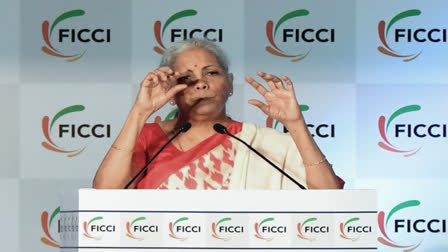New Delhi: The projected annual median GDP growth for 2024-25 is 7.0 per cent, according to the latest Economic Outlook Survey by the Federation of Indian Chambers of Commerce & Industry (FICCI). The survey highlights a forecasted median growth of 3.7 per cent for agriculture and allied activities in 2024-25, marking an improvement from the 1.4 per cent growth seen in 2023-24.
The survey attributes this positive outlook to the diminishing El Nino effect and expectations of a normal southwest monsoon, which is likely to bolster agricultural production. Furthermore, the industry and services sectors are anticipated to grow by 6.7 per cent and 7.4 per cent, respectively, in the current fiscal year.
Conducted in July 2024, the latest round of FICCI’s Economic Outlook Survey garnered insights from prominent economists representing the industry, banking, and financial services sectors. These experts provided forecasts for key macro-economic variables for the year 2024-25, including projections for Q1 (April-June) and Q2 (July-September) FY25.
According to the survey findings, median GDP growth is projected at 6.8 per cent in Q1 2024-25 and is expected to increase to 7.2 per cent in Q2 2024-25. Additionally, the median forecast for CPI-based inflation stands at 4.5 per cent for 2023-24, with a range between 4.4 per cent and 5.0 per cent. Despite persistent inflation in cereals, fruits, and milk, survey participants anticipate a decline in prices in the second quarter with the arrival of the Kharif crop yields in the market.
Regarding RBI's policy actions, economists foresee a potential reduction in the repo rate only in the latter part of the current fiscal year, as the RBI maintains a cautious stance, closely monitoring the inflation trajectory. The policy repo rate is expected to ease to 6.0 per cent by the end of fiscal year 2024-25 (March 2025).
Expectation from Budget
With the Union Budget 2024-25 scheduled for announcement next week, participating economists were asked to outline their expectations for this significant public policy announcement by the new government. They foresee policy continuity and continued momentum in the reforms already initiated by the government. On fiscal management and expenditure, the economists participating in the survey noted the government's adept handling of fiscal matters. They expect this prudent approach to continue to ensure macro-economic stability. Economists also see an opportunity for the government to leverage additional resources from robust tax collections and dividends from the Reserve Bank of India.
Regarding capital expenditure, while there was mention of the possibility to increase targets, economists do not anticipate a significant deviation from the Rs 11.1 trillion figure indicated in the interim budget for FY2025. The surveyed economists highlighted several key priorities they anticipate in the forthcoming budget:
Taxation reforms: There's an expectation for reforms aimed at stimulating economic growth, potentially including revisions in tax rates to enhance disposable income and boost consumption, especially among lower-income groups. They also suggested expanding limits under Section 80C and similar provisions to encourage long-term savings and investment. Simplification of the capital gains tax regime and streamlining GST slabs were also mentioned.
